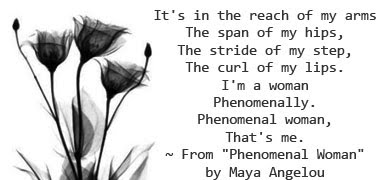I have been thinking recently about the concept of "passive aggressiveness". It is generally thought of by the Western psychology community as an unhealthy way to deal with conflict. I'm sure we've all used this term to refer to someone's actions in a derogatory way: "she didn't want to watch that movie, but she didn't tell me; she was just so passive aggressive about it!" And that's the thing. Passive aggressiveness is usually associated with women, and often ways in which women behave are seen as negative. Men are forward, aggressive, direct, truthful and psychologically healthy. Women are passive, indirect, uncommunicable, deceptive, cunning, manipulative, and ultimately, unhealthy.
It has been my experience that women usually act in indirect ways because this may be the only way to have power. When showing direct power and influence is threatening or dangerous, women resort to subtle, maybe sly, means to affect things around them. This perceived threat may be real or passed down through generations and learned by watching other women act this way. It simply makes no sense to pathologize an entire way to acting, without addressing its relationship to patriarchy. Instead of requiring that a whole population of people change to conform to the standards of the dominant group, we need to change the larger context. Our mission then should be to show women a safe world, a world where their opinions matter and where they can truly express themselves directly without fearing real or imagined repercussions.
It has been my experience that women usually act in indirect ways because this may be the only way to have power. When showing direct power and influence is threatening or dangerous, women resort to subtle, maybe sly, means to affect things around them. This perceived threat may be real or passed down through generations and learned by watching other women act this way. It simply makes no sense to pathologize an entire way to acting, without addressing its relationship to patriarchy. Instead of requiring that a whole population of people change to conform to the standards of the dominant group, we need to change the larger context. Our mission then should be to show women a safe world, a world where their opinions matter and where they can truly express themselves directly without fearing real or imagined repercussions.


4 comments:
you may be interested in this: http://blog.penelopetrunk.com/2007/08/27/try-this-dont-ask-for-what-you-want-when-you-negotiate/
Huh, yeah, I dunno. Not having looked through all her links and without being a business person myself, my instinct is to disagree with the premise somewhat. I'd believe that it's true that men know how to play "the game" better than women, and that could be a feminist issue in itself. But I don't think "not negotiating" is the answer. In fact, I've read plenty of research on gender roles and stereotypes (stuff I don't have the time to dig up and link to right now, but I could, if need be) in the workplace that says that women candidates WAY MORE THAN OBJECTIVE MEASURES are judged to be passive, emotional, rash, nondirect, etc, and these things really hurt them in the process.
So not only were "female" characteristics considered bad in the workplace generally, women were also judged more to have them.
Maybe not totally related, but somewhat, I came across this today: http://www.npr.org/2011/04/05/135149194/is-sex-discrimination-at-work-still-a-problem
Post a Comment